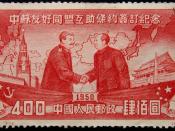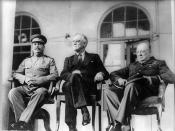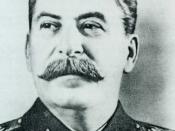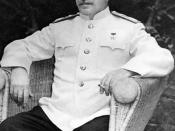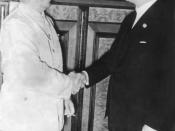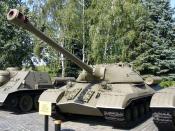"A single death is a tragedy; a million deaths is a statistic." A famous dictator, that most of the world feared, once spoke these words. Joseph Stalin was born on December 21, 1879 in Gori, Russia. His real name was Iosif Vissarionovich Djugashvili. In 1913, he adopted the name Stalin from a Russian word that means man of steel. Stalin's father, Vissarion Ivanovich Djugashvili, was an unsuccessful village shoemaker. It was said that his father was a drunk and became cruel and beat his son. Stalin's mother was a washerwoman who helped support the family. The first three children of the family died shortly after birth, and Stalin grew up as an only child. When Stalin was young, his father left the family and went to nearby Tbilisi to work in a shoe factory. When Stalin's father left, Stalin had smallpox around the age of 7, and the disease had scarred his face for life.
In 1898, Stalin joined a secret Marxist revolutionary group. The Tbilisi seminary, like many Russian schools, was a center for the circulation of forbidden revolutionary ideas. In May 1899, Stalin was expelled for not appearing for an examination. His interest in Marxism probably played a part in his dismissal.
Joseph Stalin became a cruel person once he reached his fame. Stalin executed or jailed those who had helped him rise to power because Stalin feared they might threaten his rule. Joseph Stalin changed the Soviet Union from an undeveloped country into one of the world's great industrial and military powers. "Ideas are more powerful than guns. We would not let our enemies have guns, why should we let them have ideas?" (Joseph Stalin) This quote stated by Stain shows that Stalin only cared how he thought, while he wouldn't let others oppose to his decisions. In achieving his goals, Stalin had no concern for human life if it stood in the way of progress. Adolf Hitler was his only rival when it came to mass murder. Historians believe that as many as twelve million people died from standing in the way of Stalin's ambitions. Millions died from starvation and overworking even though they had no political beliefs whatsoever.
In 1939, at around the beginning of World War II, Stalin signed a nonaggression pact with the Germans, which stated that the Nazi's would not attack the Soviets and the Soviets would do the same. As a part of this deal, Poland was invaded and split up between Germany and the Soviet Union. Stalin although not liking this deal, saw that Hitler would invade the Soviet Union sometime in the future and this pact allowed him to prepare for it. Eight days after the pact was signed, Germany invaded Poland and World War II began. One of Stalin's post-war plans was to repress the millions of Soviet citizens who were living outside of the soviet border when the war ended. The Nazi's captured some while others were living abroad. Stalin demanded that these "traitors" be sent back to the Soviet Union and they were shipped off to forced-labor camps, no better than the camps that the Nazi's had in WWII. More than 50 percent who went to these camps never came out. In 1953, Stalin died after twenty-five years of power. He had brought the government of Lenin and his revolutionary Bolsheviks back to the dictatorship.
Joseph Stalin relates to Animal Farm in many ways. Stalin becomes a leader in the world while Napoleon becomes a leader of the farm. These two leaders only care for themselves and don't care what happen to their people or animals. Stalin ordered his people around and if they disagreed, he would settle harsh punishments, just as Napoleon does to the animals on the farm. In order for both of these leaders to succeed in life they use other to do their work. Stalin used his people to help reach his fame. Napoleon used the animals on the farm to help build things. Food was short, the animals were getting old and couldn't do the work fast, but Napoleon kept pushing them until they finished what he wanted. Once they got rid of these dictators, Stalin and Napoleon, people and animals were really free. "Death solves all problems- no man, no problem." (Joseph Stalin).
